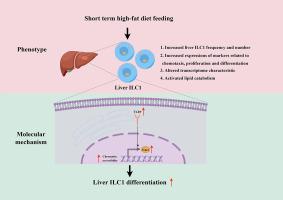短期高脂饮食诱导肝脏 ILC1 分化与 TLR9 激活有关。
IF 4.8
2区 医学
Q1 BIOCHEMISTRY & MOLECULAR BIOLOGY
引用次数: 0
摘要
膳食脂肪对健康的影响是一个重要的营养问题。然而,高脂饮食对免疫系统尤其是肝脏区域免疫功能的影响仍不清楚。最近发现肝脏 ILC1 在抗病毒防御、肝脏再生和保护肝脏免受急性损伤方面发挥着关键作用。在小鼠模型中,我们发现短期高脂饮食 2 周明显增加了肝脏中 ILC1 的频率和数量。TNF-α的产生以及TRAIL、CXCR3和CXCR6的表达也有所增加。此外,肝脏ILC1的EASY-RNAseq和ATAC-seq分析明确了短期高脂饮食反应的转录组特征和染色质可及性,这与淋巴细胞分化有关。从机理上讲,我们证明了短期高脂饮食诱导的肝脏 ILC1 的积累依赖于 TLR9 抑制剂介导的分化。综上所述,这些发现揭示了短期高脂饮食对肝脏ILC1分化的影响及其内在机制,为肝脏区域免疫功能调控提供了营养策略和理论依据。本文章由计算机程序翻译,如有差异,请以英文原文为准。

Short term high‐fat diet induced liver ILC1 differentiation associated with the TLR9 activation
The health impact of dietary fat is a significant nutritional concern. However, the effects of high-fat diet on immune system particularly the liver regional immune function remains still unclear. Liver ILC1 has been recently identified as playing crucial roles in anti-viral defense, liver regeneration, and protection against acute liver injury. Here, in a mouse model, we uncovered that short term high-fat diet for 2 weeks obviously increased the frequency and number of ILC1 in liver. The production of TNF-α and expressions of TRAIL, CXCR3 and CXCR6 were also increased. Furthermore, EASY-RNAseq and ATAC-seq of liver ILC1 clarified the transcriptome characteristics and chromatin accessibility in response to short term high-fat diet, which were involved with lymphocyte differentiation. Mechanistically, we demonstrated that accumulation of liver ILC1 induced by short term high-fat diet was dependent on a TLR9-mediated differentiation through TLR9 inhibitor. Taken together, these findings shed light on the effect and underlying mechanism of short term high-fat diet on liver ILC1 differentiation and provide nutritional strategies and theoretical basis for the liver regional immune function regulation.
求助全文
通过发布文献求助,成功后即可免费获取论文全文。
去求助
来源期刊

Journal of Nutritional Biochemistry
医学-生化与分子生物学
CiteScore
9.50
自引率
3.60%
发文量
237
审稿时长
68 days
期刊介绍:
Devoted to advancements in nutritional sciences, The Journal of Nutritional Biochemistry presents experimental nutrition research as it relates to: biochemistry, molecular biology, toxicology, or physiology.
Rigorous reviews by an international editorial board of distinguished scientists ensure publication of the most current and key research being conducted in nutrition at the cellular, animal and human level. In addition to its monthly features of critical reviews and research articles, The Journal of Nutritional Biochemistry also periodically publishes emerging issues, experimental methods, and other types of articles.
 求助内容:
求助内容: 应助结果提醒方式:
应助结果提醒方式:


